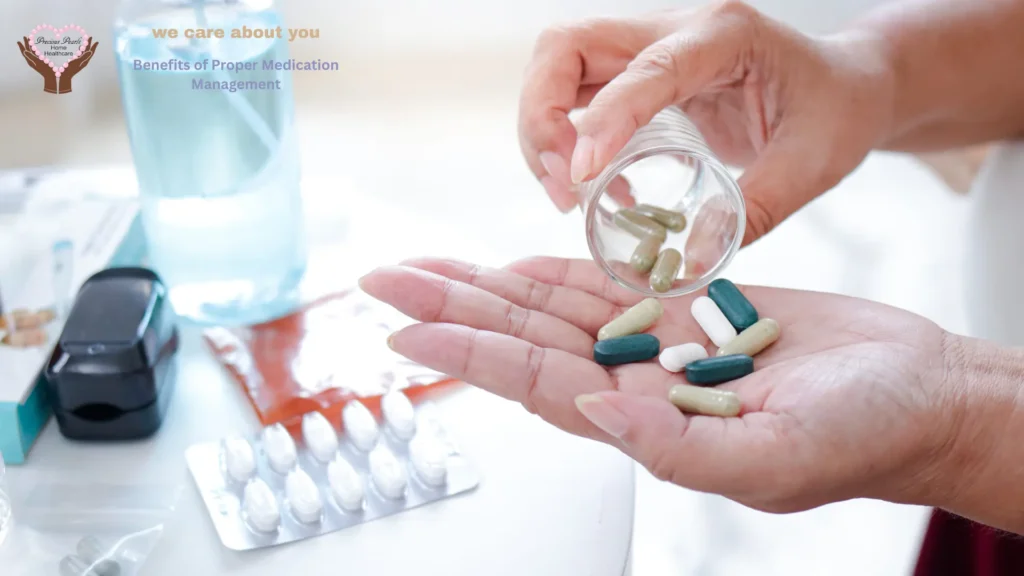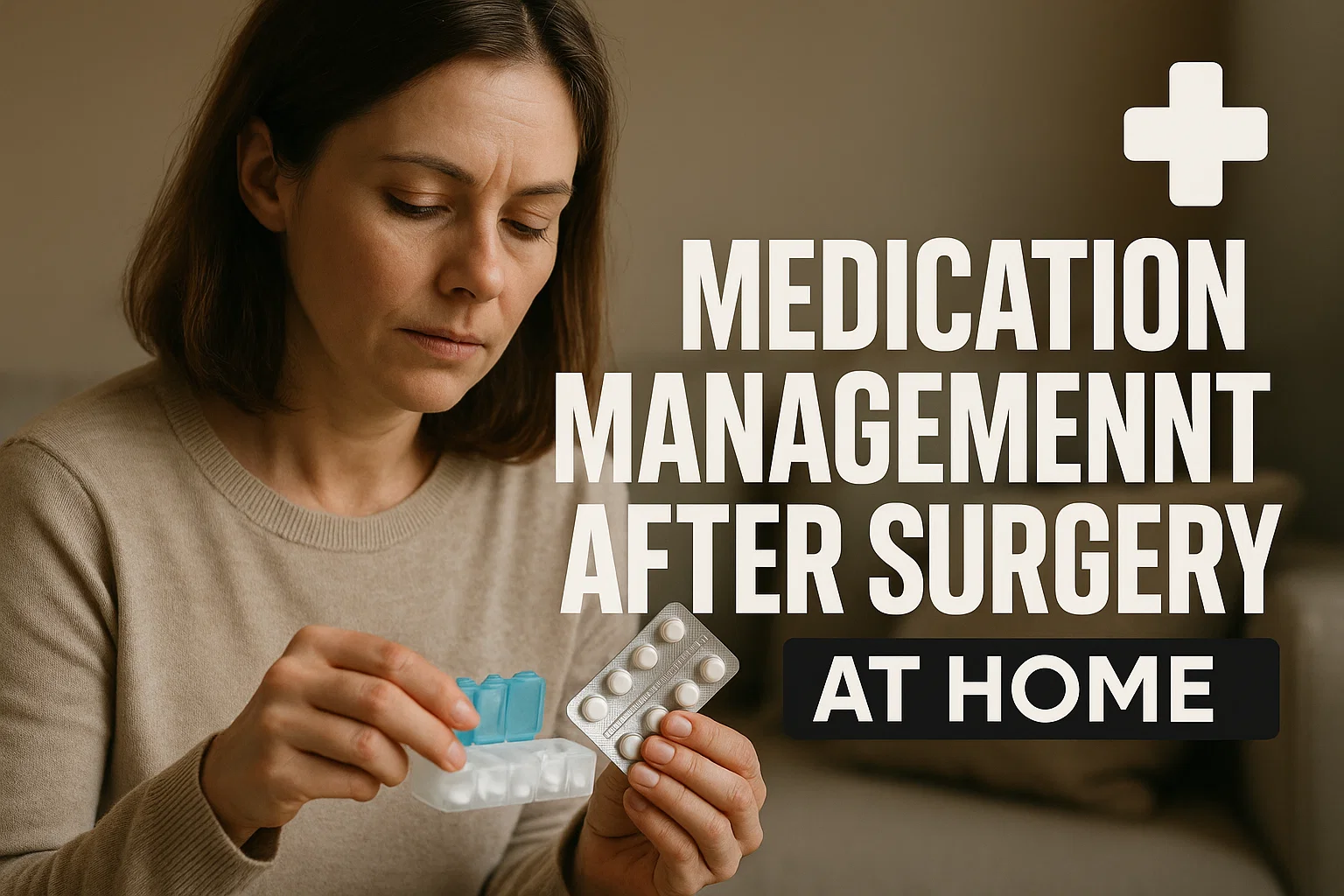The post-surgery recovery process does not simply include resting and healing, but also maintaining adherence to your medications. Doctors give painkillers, antibiotics, and occasionally long-acting medicines to avoid complications after any operation. All these can be too much to handle at home, particularly when you are exhausted and are yet to heal.
Most families in Bellmore have the challenge of ensuring that they stick to medication schedules after surgery. Doses are missed or incorrect medicine can be taken which may result in slow recovery or even fatal conditions. This is why medication management at home is such a great thing–it makes it easier, safer, and a less stressful process to both patients and Health care givers.
Why Is Medication Management After Surgery Important?
After getting out of the hospital, nurses and doctors are not available 24/7 to you anymore. At home, it is your duty- or your caregiver’s- to adhere to the proper medication regimen. This includes:
- Right medicines at the right time.
- Prevention of drug interactions that are harmful.
- Avoiding overdoses or missing doses.
- Helping to manage pain and recover more quickly.
Pills are not the only thing in medication management; it is also about the importance of ensuring that the road to recovery remains safe and effective. A clear plan is important to patients in Bellmore to prevent unnecessary hospital readmissions and to keep the healing process moving.
What Does Medication Management After Surgery at Home Involve?
Medication management in Bellmore, at home, includes a variety of steps that simplify and secure recovery. It includes:
- Prescription understanding: Understanding of what each medicine does or how it functions.
- Safe storage: storing drugs in a safe, orderly place.
- Scheduled reminders: The use of alarms, charts, or caregiver assistance to avoid the missed doses.
- Monitoring side effects: Answering the doctor with reports of any unusual reactions.
- Coordination with caregivers: It is necessary to ensure that family members or home care nurses are aware of the medication plan.
The process relieves recovery stress and offers tranquility to the patients and their loved ones.
Medication Management After Surgery at Home in Bellmore
Recovery after surgery may be a juggling process. Your body is adapting and your energy supply might be low, and to top it all, there is the burden of remembering to take medication. This is why medication management is a primary element of home recovery in Bellmore. Let’s break it down in detail.
1. Understanding the Prescriptions
The majority of the surgical patients walk out of the hospital with a prescriptions. You may have:
- Anti-infectious drugs.
- An anticoagulant to prevent the clotting of blood.
- Swelling-reducing anti-inflammatory drugs.
- Current day-to-day medications for conditions such as blood pressure or diabetes.
It becomes easy to become confused when all these overlap. An effective medication chart or list is used to monitor what pill to use, the frequency of use, and whether to useit with food or water.
2. Avoiding Missed Doses
Lack of doses after surgery may slow the healing process or result in postponement. Raw material: E.g. not taking antibiotics may raise the chance of infection, neglecting pain medication may make it more difficult to move. To avoid this:
- Take post-surgical medication prompts in Bellmore, NY, like smartphone prompts, pill boxes, or caregiver notes.
- Request the caregivers to ensure medication is taken twice, particularly in elderly people who might lose their memory.
- Have a chart visible and note it on the refrigerator or bedside.
3. Creating Safe Medication Schedules
Patients in North Bellmore and the surrounding locality are used to safe medication schedules to recover. A safe schedule:
- Schedules drugs to avoid clashes.
- Lessens the chance of overdose.
- Stocks painkillers part of other drugs.
- Aligns medicine times with meals as required.
Not only does this keep the recovery process on course, it also reduces the stress experienced by patients who might have difficulty recalling several instructions.
4. The Role of Caregivers in Medication Management
Family members and professional caregivers intervene to make sure that everything goes well. The source of prescription assistance at home care through caregivers is key- this involves:
- Retrieving prescriptions in the pharmacy.
- Putting pills in daily boxes or packets.
- A journal of all drugs taken daily.
- Being able to notice side effects and report them early.
Caregiver support is an added safety net to the elderly or patients undergoing heavy medication.
5. Home Nursing Medication Support
Patients in Bellmore who are recovering from major surgeries especially depend on home nursing medication support. A visiting nurse can:
- Give injections or IV drugs.
- Check for adverse reactions
- Check blood pressure, sugar levels, or other vital signs.
- Report the progress of the patient to the doctors.
Such professional assistance is significant to patients requiring more than just taking pills.
6. Managing Multiple Medications
Multitasking with two or more medications may be like juggling. Some guidelines on how to handle more than one medication after surgery are:
- Store medicines in different, labeled jars.
- Don’t use color-coded charts to confuse.
- Check medications with your physician so that there are no drug interactions.
- Order refills early on so that you are not caught in a lapse.
7. Importance of Adherence
Medication adherence is, maybe, one of the most crucial aspects of recovery. Adherence to the plan as given means:
- Pain management is not excessive.
- Infections are prevented
- There is no high or low blood pressure or sugar level.
- There is an avoidance of hospital readmission.
In Nassau County, a lot of post-operative readmissions occur due to the failure of patients to take their medications. This makes compliance not only useful- but a necessity.
Benefits of Proper Medication Management

Drug monitoring has several recovery advantages:
- Reduced stress to patients and families.
- Reduction in risk of hospital readmission.
- An improved management of pain and comfort.
- Better hope for home recovery.
Tips for Managing Medications After Surgery
The following are the steps to do it practically:
- Set reminders: Set reminders to track doses.
- Keep a medication log: Note each dose.
- Use pill organizers: Pill boxes may be weekly or daily pill boxes to avoid errors.
- Ask for help: You can be assisted by the caregivers, family or the nurses.
- Stay in touch with your doctor: Notify them about side effects at once..
- Prepare ahead: Fill prescriptions ahead of time.
FAQs
When you miss a dose, then just take it as quickly as you can remember, except when it is nearly time to take the next dose. Do not take two without consulting your physician.
Yes, the caregivers can make schedules, remind patients, and even organize prescription refills to ensure that nothing goes astray.
Never forget to tell your doctor and pharmacist your entire list of medications. They will align your prescriptions to prevent dangerous overlaps.
Absolutely. Adherence to your medication regimen will enable you to prevent infections and pain management, as well as lower the risk of readmission.
Pill organizers, smartphone notifications, handwritten charts ,and caregiver guidance are all viable.
Not always. However, at home with medications, including injections, intravenous, or close oversight, home-based nursing can come in quite handy.
It is based on the type of surgery. Some patients do not require medication longer than several weeks, and those who can take long-term medications for several weeks or months.
Conclusion
Home-based medication management post-surgery in Bellmore goes beyond popping pills and ensuring an effective, safe, and smooth recovery. Patients will not miss doses, minimize risks, and recover with peace of mind with the correct reminders, safe times, and caregiver assistance.
When you are healing post-surgery or because of your loved one in Bellmore or Nassau County, managing medications is one of the greatest actions that you can take to recover healthily.
To learn more about professional recovery care and support, visit Precious Pearls Home Care.






